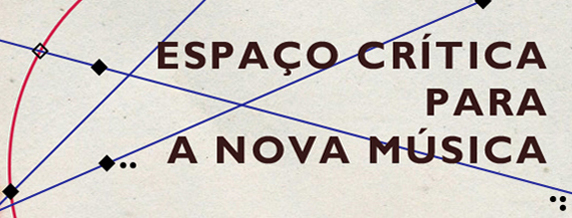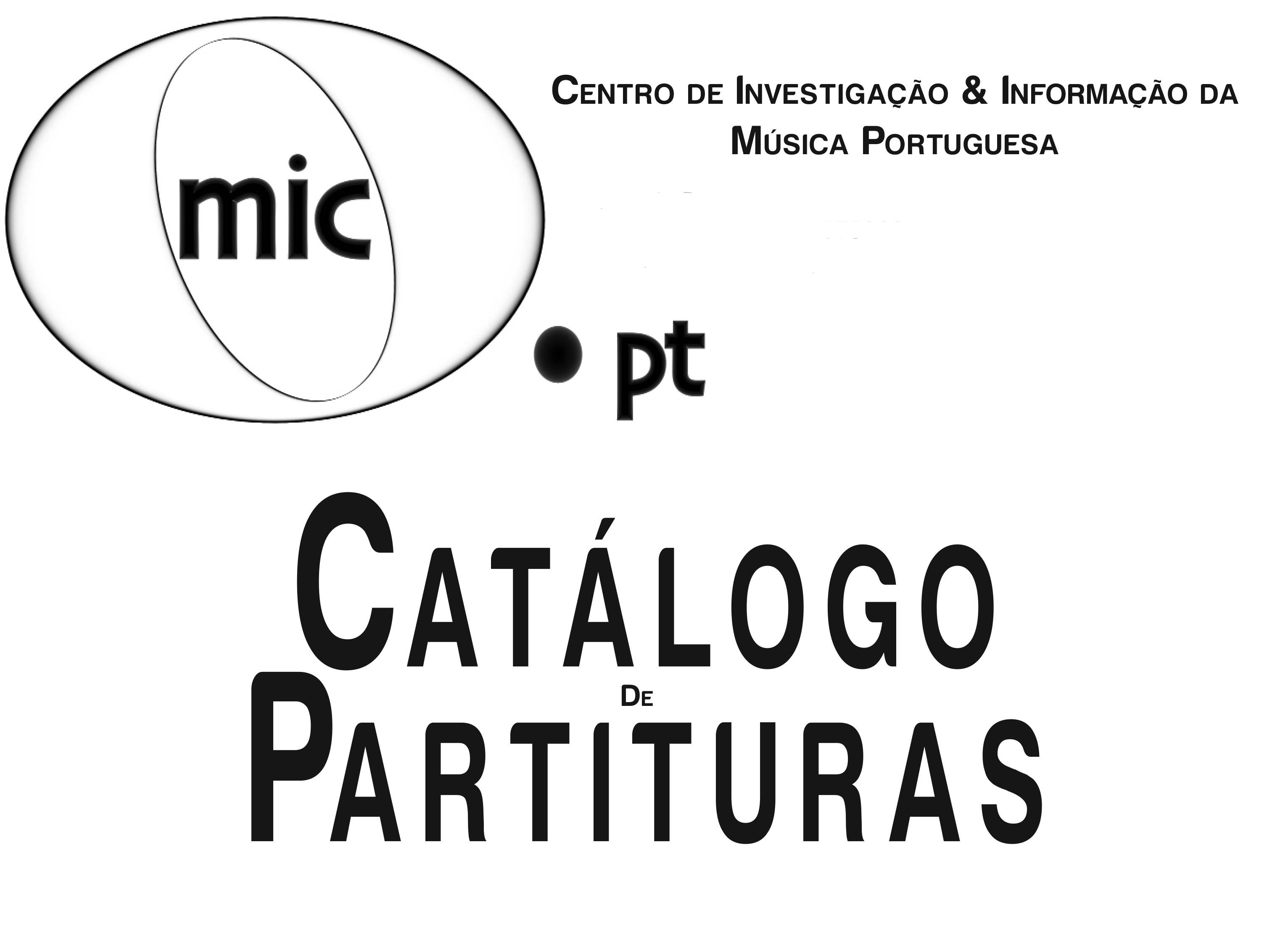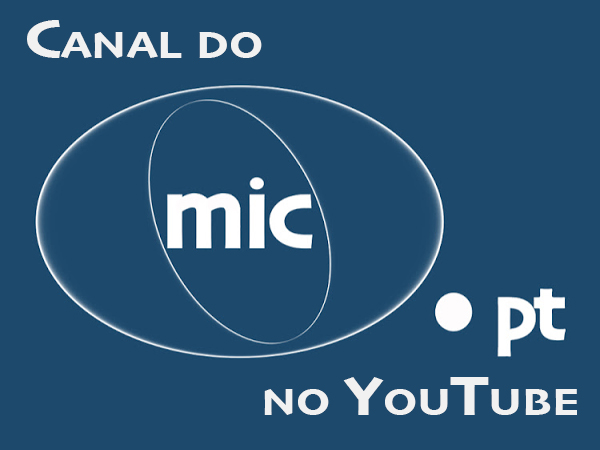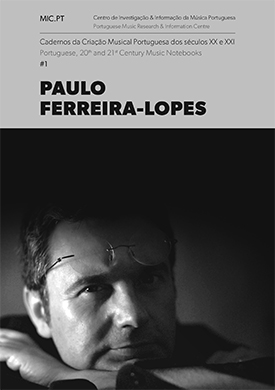 With the aim to promote the extensive material contained, on the one hand, in the MIC.PT In Focus section since 2011, and on the other, in the series of digital editions – Dossiers . Portuguese Composers of the 20th and 21st – being published since the beginning of 2015, the Portuguese Music Research & Information Centre – MIC.PT has edited and released a series of new bilingual, printed publications: Portuguese, 20th and 21st Century Music Notebooks
With the aim to promote the extensive material contained, on the one hand, in the MIC.PT In Focus section since 2011, and on the other, in the series of digital editions – Dossiers . Portuguese Composers of the 20th and 21st – being published since the beginning of 2015, the Portuguese Music Research & Information Centre – MIC.PT has edited and released a series of new bilingual, printed publications: Portuguese, 20th and 21st Century Music Notebooks
In parallel with the continuous edition of scores and other MIC.PT digital materials, through this new series we mainly intend to create a portrait of Portuguese contemporary composition and art music, thus promoting even more effectively and directly the activity of numerous Portuguese composers of the 20th and 21st centuries, whose scores are published by the MIC.PT. In this sense, the series – Portuguese, 20th and 21st Century Music Notebooks – constitutes a "visit" to the work of each composer, simultaneously being an incentive to explore and (re)discover both his or her music, as well as aesthetic, philosophical and political reflection.
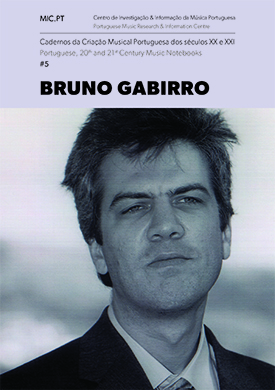 There is no doubt that this (re)discovery produces measurable results, including the introduction of music by Portuguese composers in the programmes of international events dedicated to contemporary music creation. It is precisely in this sense that the Portuguese, 20th and 21st Century Music Notebooks, constitute yet another tool for the MIC.PT and the composers (for whom it is also a kind of visit card) to effectively increase the international visibility of Portuguese contemporary music.
There is no doubt that this (re)discovery produces measurable results, including the introduction of music by Portuguese composers in the programmes of international events dedicated to contemporary music creation. It is precisely in this sense that the Portuguese, 20th and 21st Century Music Notebooks, constitute yet another tool for the MIC.PT and the composers (for whom it is also a kind of visit card) to effectively increase the international visibility of Portuguese contemporary music.
Every Notebook is constituted by the following elements: biographical note, questionnaire/interview or musicological article, catalogue of works with two orders (according to instrumentation and chronological) and discography.
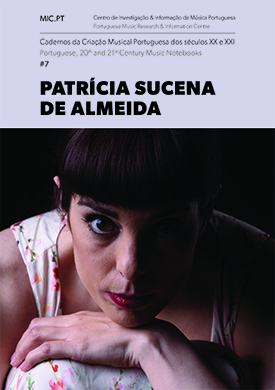 Until now the MIC.PT has published the printed versions of 10 Portuguese, 20th and 21st Century Music Notebooks, which are dedicated to:
Until now the MIC.PT has published the printed versions of 10 Portuguese, 20th and 21st Century Music Notebooks, which are dedicated to:
#1 . Paulo Ferreira-Lopes;
#2 . Sara Carvalho;
#3 . António Ferreira;
#4 . António Chagas Rosa;
#5 . Bruno Gabirro;
#7. Patrícia Sucena de Almeida;
#8 . Miguel Azguime;
#12 . João Madureira;
#15 . Isabel Soveral;
#16 . Tiago Cutileiro.
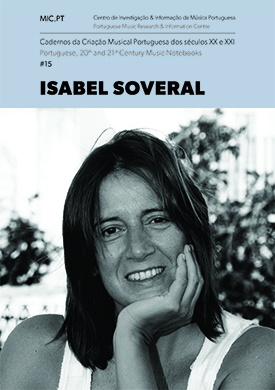 The next printed Notebooks, to be released soon, will be dedicated to the following composers: Pedro Rebelo (#10), António de Sousa Dias (#13), João Castro Pinto (#18) e [ka’mi] (#20).
The next printed Notebooks, to be released soon, will be dedicated to the following composers: Pedro Rebelo (#10), António de Sousa Dias (#13), João Castro Pinto (#18) e [ka’mi] (#20).
The central element of every Notebook is the MIC.PT questionnaire/interview – an “introspection” to the creative universe of the composers, where each one of them reveals us not only his/her music roots and inspirations, but also the qualities of his/her music language, projections for the future and concerns regarding the situation in the Portuguese art and research music…
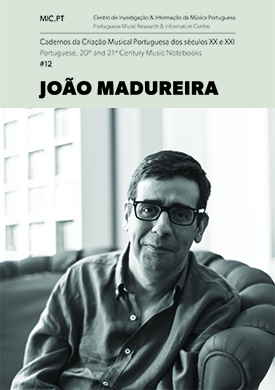 . "Composition was my first lover. Obviously, my parents were very much concerned with my future, particularly when I decided to continue studying composition at an academic level. They would have preferred to see me mastering the law, for example" – says João Madureira (Notebook #12), giving answer to the question about the ptahs that led him to composition.
. "Composition was my first lover. Obviously, my parents were very much concerned with my future, particularly when I decided to continue studying composition at an academic level. They would have preferred to see me mastering the law, for example" – says João Madureira (Notebook #12), giving answer to the question about the ptahs that led him to composition.
. "This question makes me want to smile…" – responds Paulo Ferreira-Lopes (Notebook #1) to the question about the references form the past in his practice. "It is difficult to reconstruct every detail. The history of a life cannot be reconstructed by means of additive processes, where at the end we come across a sum, or where we add repeatedly some elements in order to subsequently reduce the effort of adding the whole!"
. "The will to compose has always been present: listening
is my instrument, which I always practice" – says António Ferreira in the Notebook #3. "Yet the concretization of music depends on certain aspects, concerning my present situation. Can I dedicate myself during various months to composition without major interruptions? Or do I need to arrange financing in order to liberate my time?" – asks the composer, giving answer to the question on the ways to reconcile the dichotomy: "occupation – vocation".
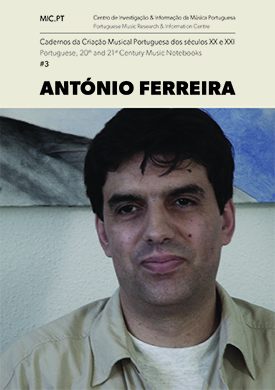 . Reflecting on the question of the influence of extra-musical sources in her creation, the composer and photographer Patrícia Sucena de Almeida (Notebook #7) says: “I think that we should never ignore other forms of art, even if the composition part is purely instrumental. They follow a path, which turns out to be common historically, aesthetically, stylistically, etc., and in this sense analysing them is of great interest. In my case, I don’t consider them only as sources or influences but they can coexist in the act of creation, interacting between each other”.
. Reflecting on the question of the influence of extra-musical sources in her creation, the composer and photographer Patrícia Sucena de Almeida (Notebook #7) says: “I think that we should never ignore other forms of art, even if the composition part is purely instrumental. They follow a path, which turns out to be common historically, aesthetically, stylistically, etc., and in this sense analysing them is of great interest. In my case, I don’t consider them only as sources or influences but they can coexist in the act of creation, interacting between each other”.
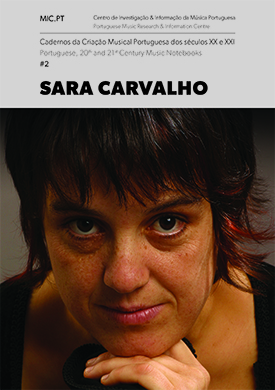 . And is music capable of expressing any concrete thing, other than itself – an emotion, mental attitude, psychological disposition or natural phenomenon? "For me music is incapable of not expressing anything" – says Sara Carvalho in the Notebook #2. "If what it expresses to each one of us is what the composer idealized, does not seem relevant to me. Music has the power to induce what Walton used to call as «imagenings», that is, music provokes imaginative representations".
. And is music capable of expressing any concrete thing, other than itself – an emotion, mental attitude, psychological disposition or natural phenomenon? "For me music is incapable of not expressing anything" – says Sara Carvalho in the Notebook #2. "If what it expresses to each one of us is what the composer idealized, does not seem relevant to me. Music has the power to induce what Walton used to call as «imagenings», that is, music provokes imaginative representations".
. In the Notebook #15 the composer Isabel Soveral reveals us some secrets of her compositional technique, that is, how in her work does she develop the musical discourse: "In the beginning of the creative process I search for a germinal material – the primary music elements. Then, as a result of the embellishment and development of these elements, a «fabric» of sonic material emerges. It’s the sonic material leading towards the construction of a more concrete musical idea. This whole creative process should be developed without formal contradictions, in order to let the musical narrative happen naturally".
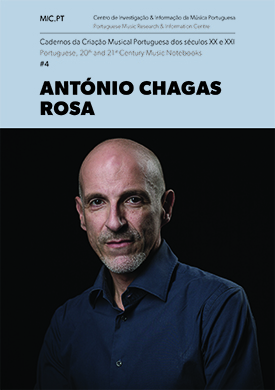 . On his part, in the Notebook #4, António Chagas Rosa reaches this conclusion on the concept of the "avant-garde" in the present: "Presently, and on the contrary to what I thought some 15 years ago, the concept
of «avant-garde» doesn’t tell me anything. Perhaps an avant-garde artist is the one capable of discovering a new time within an old one, although this expression doesn’t have great value. It is an ephemeral gesture, just as a wave dissolving on a beach".
. On his part, in the Notebook #4, António Chagas Rosa reaches this conclusion on the concept of the "avant-garde" in the present: "Presently, and on the contrary to what I thought some 15 years ago, the concept
of «avant-garde» doesn’t tell me anything. Perhaps an avant-garde artist is the one capable of discovering a new time within an old one, although this expression doesn’t have great value. It is an ephemeral gesture, just as a wave dissolving on a beach".
. The discovery of the "new" is particularly important for Tiago Cutileiro (Notebook #16) who, responding to the question on the importance of experimentalism in his music, says: "I would dare to say that we have much more art, and I mean good art, than we actually need. Why fill the world with more art, if it wouldn’t be to discover new paths? So as composer, on the account of this whole creative proliferation, I can’t encounter any other useful working area that wouldn’t be precisely the experimentalism – the search for new paths. Only in this field do I see hope to find something new that is worth showing to a world already packed with art and too many other things. Outside experimentalism, I feel that humanity is drowned in too many perfect artworks, of all the genres, and with very little more to add".
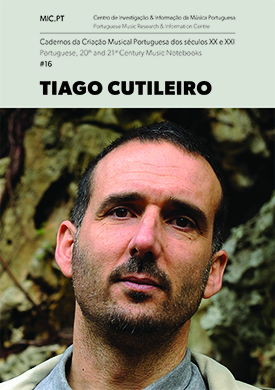 . Not less important are the questions regarding the present situation of Portuguese music and the composer's role in the society, among which Bruno Gabirro's (Notebook #5) opinion is the one standing out: "There are old problems that have never been solved, and which continue to exist and have always prevented a true implantation of a healthy musical life in our country. Nevertheless I think that independently of his/her situation, the composer’s role has always been the same. Inside the conditions, problems and demands of every period, the work of composer is to pose questions, think, imagine and make music, and in this context to act as a force for change in the surrounding world, taking other paths and considering other possibilities".
. Not less important are the questions regarding the present situation of Portuguese music and the composer's role in the society, among which Bruno Gabirro's (Notebook #5) opinion is the one standing out: "There are old problems that have never been solved, and which continue to exist and have always prevented a true implantation of a healthy musical life in our country. Nevertheless I think that independently of his/her situation, the composer’s role has always been the same. Inside the conditions, problems and demands of every period, the work of composer is to pose questions, think, imagine and make music, and in this context to act as a force for change in the surrounding world, taking other paths and considering other possibilities".
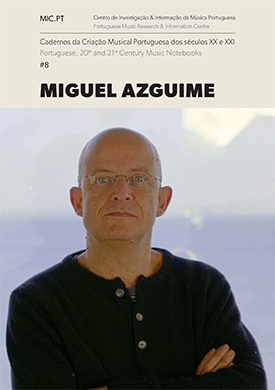 . And what is the future of art music? "I consider of the utmost and most vital importance that the Art in general and the Art of music in particular, in society, and outside the financial interests and the market, continues to resist and to be developed in order to ensure the permanence of these values. Art, just as science and scientific research, is knowledge, constituting a true intelectual and psychological model of civilizational thought. And so that Art continues to exist it needs to remain free – emphasizes Miguel Azguime in the Notebook #8.
. And what is the future of art music? "I consider of the utmost and most vital importance that the Art in general and the Art of music in particular, in society, and outside the financial interests and the market, continues to resist and to be developed in order to ensure the permanence of these values. Art, just as science and scientific research, is knowledge, constituting a true intelectual and psychological model of civilizational thought. And so that Art continues to exist it needs to remain free – emphasizes Miguel Azguime in the Notebook #8.
© MIC.PT . September 2018
 With the aim to promote the extensive material contained, on the one hand, in the MIC.PT In Focus section since 2011, and on the other, in the series of digital editions – Dossiers . Portuguese Composers of the 20th and 21st – being published since the beginning of 2015, the Portuguese Music Research & Information Centre – MIC.PT has edited and released a series of new bilingual, printed publications: Portuguese, 20th and 21st Century Music Notebooks
With the aim to promote the extensive material contained, on the one hand, in the MIC.PT In Focus section since 2011, and on the other, in the series of digital editions – Dossiers . Portuguese Composers of the 20th and 21st – being published since the beginning of 2015, the Portuguese Music Research & Information Centre – MIC.PT has edited and released a series of new bilingual, printed publications: Portuguese, 20th and 21st Century Music Notebooks There is no doubt that this (re)discovery produces measurable results, including the introduction of music by Portuguese composers in the programmes of international events dedicated to contemporary music creation. It is precisely in this sense that the Portuguese, 20th and 21st Century Music Notebooks, constitute yet another tool for the MIC.PT and the composers (for whom it is also a kind of visit card) to effectively increase the international visibility of Portuguese contemporary music.
There is no doubt that this (re)discovery produces measurable results, including the introduction of music by Portuguese composers in the programmes of international events dedicated to contemporary music creation. It is precisely in this sense that the Portuguese, 20th and 21st Century Music Notebooks, constitute yet another tool for the MIC.PT and the composers (for whom it is also a kind of visit card) to effectively increase the international visibility of Portuguese contemporary music. Until now the MIC.PT has published the printed versions of 10 Portuguese, 20th and 21st Century Music Notebooks, which are dedicated to:
Until now the MIC.PT has published the printed versions of 10 Portuguese, 20th and 21st Century Music Notebooks, which are dedicated to: The next printed Notebooks, to be released soon, will be dedicated to the following composers:
The next printed Notebooks, to be released soon, will be dedicated to the following composers:  . "Composition was my first lover. Obviously, my parents were very much concerned with my future, particularly when I decided to continue studying composition at an academic level. They would have preferred to see me mastering the law, for example" – says
. "Composition was my first lover. Obviously, my parents were very much concerned with my future, particularly when I decided to continue studying composition at an academic level. They would have preferred to see me mastering the law, for example" – says  . Reflecting on the question of the influence of extra-musical sources in her creation, the composer and photographer
. Reflecting on the question of the influence of extra-musical sources in her creation, the composer and photographer  . And is music capable of expressing any concrete thing, other than itself – an emotion, mental attitude, psychological disposition or natural phenomenon? "For me music is incapable of not expressing anything" – says
. And is music capable of expressing any concrete thing, other than itself – an emotion, mental attitude, psychological disposition or natural phenomenon? "For me music is incapable of not expressing anything" – says  . On his part, in the Notebook #4,
. On his part, in the Notebook #4,  . Not less important are the questions regarding the present situation of Portuguese music and the composer's role in the society, among which
. Not less important are the questions regarding the present situation of Portuguese music and the composer's role in the society, among which  . And what is the future of art music? "I consider of the utmost and most vital importance that the Art in general and the Art of music in particular, in society, and outside the financial interests and the market, continues to resist and to be developed in order to ensure the permanence of these values. Art, just as science and scientific research, is knowledge, constituting a true intelectual and psychological model of civilizational thought. And so that Art continues to exist it needs to remain free – emphasizes
. And what is the future of art music? "I consider of the utmost and most vital importance that the Art in general and the Art of music in particular, in society, and outside the financial interests and the market, continues to resist and to be developed in order to ensure the permanence of these values. Art, just as science and scientific research, is knowledge, constituting a true intelectual and psychological model of civilizational thought. And so that Art continues to exist it needs to remain free – emphasizes 